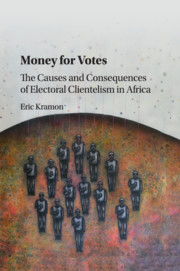Book contents
- Frontmatter
- Contents
- List of Tables
- List of Figures
- Acknowledgments
- Part I The Puzzle of Electoral Clientelism
- Part II Empirical Evidence
- 4 The Mechanics of Electoral Clientelism: Descriptive Evidence
- 5 Why is Electoral Clientelism Effective?: Experimental Evidence
- 6 Who Invests in Electoral Clientelism?: Incumbents versus Challengers
- 7 Electoral Clientelism and Ethnic Politics
- 8 Electoral Clientelism and the Provision of Local Public Goods
- 9 Conclusion
- Appendices
- Bibliography
- Index
9 - Conclusion
from Part II - Empirical Evidence
Published online by Cambridge University Press: 26 October 2017
- Frontmatter
- Contents
- List of Tables
- List of Figures
- Acknowledgments
- Part I The Puzzle of Electoral Clientelism
- Part II Empirical Evidence
- 4 The Mechanics of Electoral Clientelism: Descriptive Evidence
- 5 Why is Electoral Clientelism Effective?: Experimental Evidence
- 6 Who Invests in Electoral Clientelism?: Incumbents versus Challengers
- 7 Electoral Clientelism and Ethnic Politics
- 8 Electoral Clientelism and the Provision of Local Public Goods
- 9 Conclusion
- Appendices
- Bibliography
- Index
Summary
Electoral clientelism is a common, and often colorful, feature of elections in many low-income democracies around the world. The goal of this book has been to advance understanding of the role of electoral clientelism during elections, and to better understand the link between electoral clientelism and democratic accountability and responsiveness.
In the course of conducting fieldwork for this project, I found that the literature's dominant models of electoral clientelism were not sufficient to explain patterns of electoral clientelism in Kenya. I found that politicians use electoral handouts not to directly buy votes but instead to convey to voters their commitment to delivering resources to them and to serving their interests in the future. I further found that distributing money on the campaign trail is critical to being taken seriously as a candidate. Those who do not hand out cash are widely perceived as too weak to win and thus not worthy of electoral support. These observations form the basis of the informational theory.
While one goal of this book has been to develop a theoretical framework more consistent with patterns of electoral clientelism in Kenya, an additional goal has been to subject the theory to a set of diverse empirical tests that take seriously the inferential and measurement challenges involved in the study of clientelism. Most empirical research on clientelism is either purely qualitative or based upon survey data.While both can yield rich insights—the former was central to the development of the informational theory—they are both vulnerable to the critique that their inferences may be biased due to measurement problems, difficulties isolating clientelism's causal impact, or both. To address these empirical challenges, this book has adopted a pluralistic approach. I present evidence from indepth and semi-structured interviews with voters in seven of Kenya's eight provinces, a list experiment conducted with a nationally representative sample of 2,000 Kenyans, and a field experiment designed to identify electoral clientelism's causal impact and to assess the mechanisms through which clientelism influences voter behavior. While each of these approaches has its strengths and weaknesses, taken together the results paint a picture that is consistent with the informational theory.
- Type
- Chapter
- Information
- Money for VotesThe Causes and Consequences of Electoral Clientelism in Africa, pp. 180 - 190Publisher: Cambridge University PressPrint publication year: 2017



